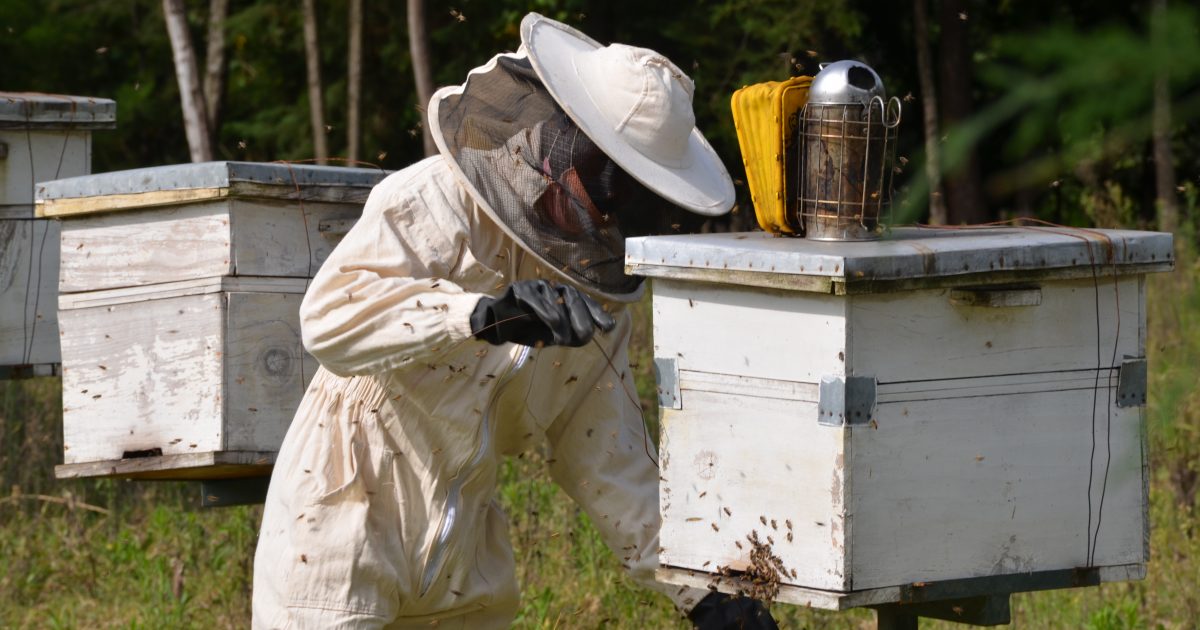On May 20th every year, the world celebrates the World Bee day to create awareness on the importance of bees and other pollinators in improving the ecosystem, food security, nutrition and livelihoods.
The day also seeks to recognize the contribution that honey bees make to everyday lives, as well as learning about the different steps to take to protect the bees in a bid to ensure they are healthy and well-managed to pollinate crops.
It is for this reason that Kenya News Agency visited the Friends of Africa beekeepers organisation that is located at Mutonyi area in Narok North Sub County who own about 50 beehives set up in a seven-acre piece of land.
The organisation’s field officer, Solomon Tumpees, said the reason they adapted apiculture is to conserve the environment while boosting their livelihood.
The unpredictable weather patterns and crop failure leading farmers to go at a total loss, he said, was a major motivation to the group that comprises ten members.
Tumpees observed that bee keeping is one of the cheapest ways of farming because once the hive is set up and has a strong colony, the harvest is sure.
“We want to encourage our people to embrace bee keeping because it is one of the cheapest ways of farming. Once you set up a colony, you may be able to harvest it regularly without putting in a lot of work,” he said.
According to Tumpees, one hive can produce up to 25 kilograms of honey; three times per year which when processed is equivalent to 18 to 20 kilograms of liquid honey.
He explained that one kilograme of liquid honey sells at Sh.700 meaning one hive can give up to Sh 42, 000 per year.
Tumpees who has been in the bee industry for five years now says there is such a huge market for honey that the current farmers cannot satisfy therefore more farmers need to take up apiculture.
He said honey is famous for its medicinal value as raw honey boosts immunity and has anticancer benefits; however, heavy processing destroys these valuable nutrients.
The antioxidants found in honey, he said, have been linked to lowering the risk of strokes, heart attacks as well as in assisting in terms of eye health.
He explained other products associated with bee include products like propolis, which helps in fighting infections and royal jelly, which has an anti-aging and fertility boosting effect.
Another product of bees is bee wax that is used as lubricant and waterproofing agent, making candles, encaustic painting and in cosmetics.
When harvesting, Tumpees said they use smoke to calm the bees, as smoke is believed to cut off communication between the queen and the rest of the colony hence keeping the bees calm.
For honey dealers who compromise the quality of honey, Tumpees asked the security officials and department of public health to be vigilant in arresting them.
The cheapest way of testing for the fake honey is by putting honey in a glass of water and in case it dissolves, then it is fake because honey has a thick texture that will settle at the bottom of the glass.
The organisation’s director Dr Naikuni Nchorira reiterated that the friends of African bee organisation came together to boost the quality of food production in the country as well as addressing the food shortage scenarios that are sometimes experienced in parts of the country.

He added that the group has a vision of meeting the demand of honey in local and international markets, as the demand of organic honey is high.
“Organic honey is honey free from any chemicals and we are trying as much as we can to promote this organic honey as a food complement,” he said.
He rubbished the perception that bee keeping business is only done by the ‘Durubu community who live in the forest asking people to change their minds to adapt the business.
“There is a stereotype among the Maa community that bee keeping is a practice done by the ‘Durubu’ people who live in the forest, we want to change the minds of people that it is possible to venture into alternative business using the little resources you have and take care of the family,” said Dr Nchorira.
He called on those willing to join the business to consult the experts first to get good results saying the quality of the beehive and the set up matters for one to get good results.
“Some people have been deceived and ventured into the business without proper advice and upon buying the hives, they stay for years without being colonised,” he said adding that the organisation offers free advice to farmers who buy bee hives from them at a cost of Sh 3, 500.
At the same time, Nchorira who is also a lecturer at the Maasai Mara University lamented on the decreasing population of the black African bee because of chemicals used in the farm.
He therefore called on legislators to make laws that will control the kind of chemicals used in farms as they have a severe effect on bees.
This year’s world bee day celebrations theme is ‘Build back better for bees’.
By Ann Salaton





